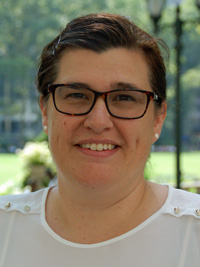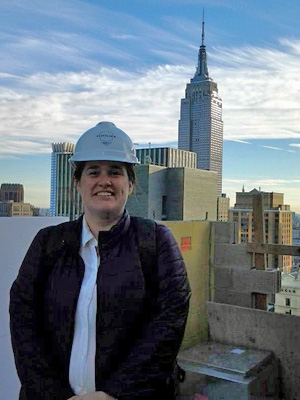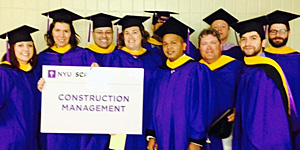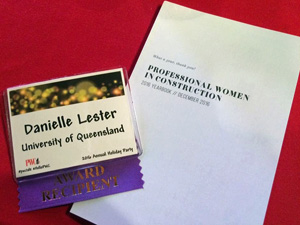Dr. Danielle Lester is a clinical assistant professor at New York University’s Schack Institute of Real Estate. She joined from the University of Queensland, where she has just completed her Ph.D. in Civil Engineering and Behavioural Economics, having spent more than ten years as a quantity surveyor on major and mega projects in the UK, Australia and the USA. Danielle is a Fellow of RICS (the Royal Institution of Chartered Surveyors) and was recently named as an outstanding woman in construction in New York City by Professional Women in Construction USA.

“…It wasn’t really until I left the UK for Australia that I realised just how important the skills of a quantity surveyor are…”
From Junction 9 of the M6 to New York
I’ve always been a very hands-on practical person with a business brain, so after studying property and business, and graduating with a B.Sc. in Valuation Surveying I quickly realised that unless I was on a construction site up to my knees in mud and surrounded by heavy equipment with plenty of problems to solve, I was probably going to get easily bored.
My career as a quantity surveyor started under Junction 9 of the M6 motorway. I had been to many similar interviews for quantity surveying roles on housing developments based on advice from career advisors, as that was apparently closest to my education. During my first interview for a civil infrastructure role, my mind was immediately blown and I was sold by the prospect of concrete repairs using high pressure water demolition, and cathodic protection!

on top of a hotel that was being built on 42nd street in Manhattan
I have since worked on major and mega projects across the UK, Australia, and the USA whilst completing my M.Sc. in Construction Management at New York University. Watching the landscape change shape by improving existing systems and providing new ones, and seeing people interacting with their environments based on changes that you were part of is an exciting and rewarding part of my career in the built environment.
From building site to lecture theatre
I have only recently started my role as clinical assistant professor at New York University after completing my Ph.D. earlier this year. As this is my first semester, most of my week is spent preparing for my next lecture, and marking the previous weeks’ homework. The rest of my time is spent corresponding with my original research committee to explore new research ideas, and helping organise events and mentoring opportunities for students and those new to careers in the built environment.
I’ve actually just finished writing my mid-term exam for the class, so fingers crossed they all do well. It is very rewarding to see the progress your students make throughout the semester, something I’m grateful for. It is quite a change from being on site, but I still manage to get out and see ongoing projects as much as possible.
How behavioural economic theory can be applied to the built environment
Behavioural economics is the study of psychology as it relates to the economic decision-making processes of individuals and institutions. The focus of my research was based on the comprehensive work of Bent Flyvbjerg (the first director of the BT Centre for Major Programme Management at Oxford University’s Saïd Business School) who has dedicated his career to the analysis and evaluation of performance outcomes on megaprojects.
Flyvbjerg inferred that project failure (defined as cost overruns and schedule delays) is the result of human behaviour, specifically delusion and deception. I decided to explore the role that civil engineers play in decision-making on mega projects, as, in my experience, civil engineers made up the majority of the project teams I had worked with.

I reviewed current engineering education practice to assess what we did (if anything) to create the behaviours of delusion and deception, and what changes we could make to moderate that behaviour. The research also has implications for industry, as many of the factors affecting a learning environment can also be applied to a job site and work environment.
The problems we experience are very much related to way in which we measure success, both in education and industry, and I now hope to work with educators and industry to change these measures and create better quality decision-making in the process.
The role of a quantity surveyor and why it’s so important
My role as a quantity surveyor involved the commercial management of construction contracts and the cost management, financial reporting, and forecasting that comes with it. I’ve worked for large contractors managing subcontracts of varying sizes and values, and also worked for subcontractors, again on contracts of varying sizes and value, ensuring that all parties involved in a contract are compensated fairly for the scope of works for which they are contracted and instructed to carry out.
It wasn’t really until I left the UK for Australia that I realised just how important the skills of a quantity surveyor are. To be trained and experienced in the concept of measurement as a tool for contract management is something I took for granted before I started working on projects where other members of the team, who were specially trained and experienced in other aspects of construction, got involved with the contractual and financial side of the project. This was another observation that led to my Ph.D. research interest of decision-making behaviours.
Problem solving in construction – exhilarating and exhausting
The construction industry is incredible, and, until now, I’ve spent most of my career outside, witnessing first hand change taking place. I have met some of the most incredible people from all over the world where we’ve shared stories of project success, and the inevitable project failures.

Learning from each other about how a similar problem was solved in the past, or putting your heads together to map out the solution to a unique and obscure problem is both exhilarating and exhausting (in a good way!). Being able to walk, drive, or ride into a structure that you have helped deliver is a very special tangible aspect that is unique to us working in the built environment.
I remember getting quite emotional watching Sir Steve Redgrave run the Olympic Torch into the stadium at London 2012 and seeing all those construction guys and gals in the tunnel looking so proud and excited that their project was open for business!
“Hold your line.”
I think the only positive advice that I have received as a woman in a male dominated environment was actually from my dad. He has often struggled to get his head around what I actually do (and why!) but his one piece of advice that has always stuck with me was: “hold your line”, which basically means “stick to your guns – if you believe you’re right and have good solid evidence to back it up, then don’t give in”.
This is what has helped me push through the negative advice. During my early career I was often expected to carry out different tasks to my male counterparts who were progressing and being rewarded at a faster rate. This led me to seek out my own path, and take on challenges leading to a far greater learning experience. At many steps along the way I have been told: “you’re not ready for that” and have since spoken to some of my early employers who agreed that I was right to ignore their advice!
Professional networks and support
I have been involved with RICS (the Royal Institution of Chartered Surveyors) since becoming a student member back in 2000 during my undergraduate studies. As an organisation dedicated to setting, maintaining, and raising standards in the built environment, I have found that my personal integrity mirrors the values of RICS, providing me with a place to not only enhance and develop my own career, but also work with others to help them on their paths too.
I have counselled and assessed candidates through their Assessments of Professional Competence, and also contributed to the development of education standards and initiatives during my time in Australia. I now hope to do the same in the USA. Seeking out RICS in each of the countries I have worked has been like seeking out my adoptive family!

During my time with NAWIC, I was fortunate enough to lead the development and implementation of a multilevel mentoring programme, and regularly sat on the award panel for the state and national scholarship programme.
Quest to find answers to global matters within the built environment
As I settle in to my new academic role at New York University, I will be exploring new ways to apply my research to areas of education and industry where I can make a difference. My research interests are at the intersection of large-scale transport infrastructure investment, behavioural economics, organisational leadership, and decision-making.
My appointment at New York University coincides with a growing acknowledgement of the national infrastructure crisis in the USA, where I plan to play an increasingly important role in applied research, and shaping urban and infrastructure policy.
In summary, my entire career has been dedicated to enhancing education in the built environment whilst setting, maintaining, and raising global standards across both education and industry. My career path has now become a quest to find answers to global matters that speak to public interests within the built environment.
https://www.linkedin.com/in/danielle-lester-phd-frics-b6082a1b/
http://scps.nyu.edu/academics/departments/schack.html





